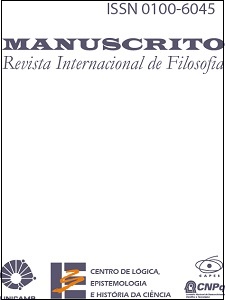Resumo
Este artigo procura interpretar as noções de movimento, comportamento e ação em relação umas com as outras. Primeiro, argumentase que o movimento é um evento nomologicamente descrito por meio de uma teoria mecânica, e seus conceitos e modelos. Igualmente, o comportamento é o tipo de evento humano (ou animal) funcionalmente descrito por meio de modelos probabilísticos que relacionam o que fazem diferentes indivíduos em circunstâncias nas quais uma descrição mecânica não é explicativa de forma relevante. Assim compreendido, o comportamento é essencialmente um fenômeno social. Finalmente, a ação é o tipo de acontecimento humano que não pode ser explicado nomologicamente. O conceito de ação defendido deste modo é, fundamentalmente, residual em relação aos conceitos de comportamento e movimento.
Referências
DAVIDSON, D. Essays on Actions and Events. Oxford: Oxford University Press, 1980.
DENNETT, D. Brainstorms. Philosophical Esssays on Mind and Psychology. Cambridge, Mass.: The MIT Press, 1978.
DENNETT, D. The Intentional Stance. Cambridge, Mass.: The MIT Press, 1987.
DUTRA, L.H. de A. “Réalisme et Fictionalisme chez Claude Bernard.” Dialogue, XXXVIII, pp. 719-742, 1999.
DUTRA, L.H. de A. “Quine on the Nature of Mind: From Behaviorism to Anomalous Monism.” In: L.H. de A. Dutra, e C.A. Mortari, (orgs.). Princípios. Seu Papel na Filosofia e nas Ciências. Florianópolis: NEL, 2000.
DUTRA, L.H. de A. “Mental Events and Properties.” In: A.O. Cupani, C.A. Mortari, (orgs.). Linguagem e Filosofia. Anais do Segundo Simpósio Internacional Principia. Florianópolis: NEL, 2001.
DUTRA, L.H. de A. “Propositional Attitudes, Intentionality and Lawful Behaviors.” Principia 7(1-2): 93-114, 2003.
DUTRA, L.H. de A. “How Serious is Our Ontological Commitment to Events as Invidivuals?” Principia 9(1-2): 43-71, 2005.
EDDINGTON, A.S. [1928]. The Nature of the Physical World. New York: The Macmillan Co., 1948.
GARDNER, H. The Mind’s New Science. New York: Basic Books, 1985. JAMES, W. Essays in Radical Empiricism. Boston: Longmans, Green & Co., 1912.
PINKER, S. How the Mind Works. New York/London: W. W. Norton & Co., 1997.
QUINE, W. v. O. 1953. “On What There Is.” From a Logical Point of View. Cambridge, Mass.: Harvard University Press.
QUINE, W. v. O. Word and Object. Cambridge, Mass.: The MIT Press, 1960.
QUINE, W. v. O. Ontological Relativity and Other Essays. New York/London: Columbia University Press, 1969.
QUINE, W. v. O. The Roots of Reference. La Salle, Ill.: Open Court, 1974.
QUINE, W. v. O. Ways of Paradox and Other Essays. Cambridge, Mass./London: Harvard University Press, 1976.
RACHLIN, H. Judgment, Decision, and Choice. A Cognitive/Behavioral Synthesis. New York: W. H. Freeman & Co., 1989.
RACHLIN, H. Behavior and Mind. The Roots of Modern Psychology. New York/Oxford: Oxford University Press, 1994.
RUSSELL, B. [1921]. The Analysis of Mind. London: Routledge, 1997.
SKINNER, B.F. [1953]. Science and Human Behavior. New York: Macmillan, 1965.
SKINNER, B.F. Contingencies of Reinforcement: A Theoretical Analysis. New Jersey: Prentice-Hall, 1969.
SKINNER, B.F. [1974]. About Behaviorism. New York: Vintage, 1976.

